Worthy of note
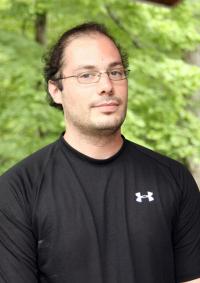 For those of us who dreaded making mistakes in math, the words of mathematics fellow Jean-Martin Albert (right) are a balm to the soul. “I want the students to fall into traps,” he said cheerfully, “to make mistakes and learn to see exactly where they made them and how to recover from them.” Jean-Martin’s enthusiasm for math shows that it can actually be fun, even useful. He received his M.Sc. in mathematics from the University of Calgary and is currently completing his doctorate in mathematics at McMaster University. Jean-Martin’s research interests are in mathematical logic, specifically something new and mysterious called continuous model theory and its applications to functional analysis.
For those of us who dreaded making mistakes in math, the words of mathematics fellow Jean-Martin Albert (right) are a balm to the soul. “I want the students to fall into traps,” he said cheerfully, “to make mistakes and learn to see exactly where they made them and how to recover from them.” Jean-Martin’s enthusiasm for math shows that it can actually be fun, even useful. He received his M.Sc. in mathematics from the University of Calgary and is currently completing his doctorate in mathematics at McMaster University. Jean-Martin’s research interests are in mathematical logic, specifically something new and mysterious called continuous model theory and its applications to functional analysis.
“I feel fortunate to be working at a place where I can just go and do some hands-on art sometimes,” said ceramics professor Martina Lantin. Last July, she and fellow art faculty member Cathy Osman attended a two-week silk-screening workshop at Haystack Mountain School of Crafts, in Maine. Martina was working on patterned, silkscreened wallpaper, to be used as part of her installation at the Brattleboro Museum and Art Center. “Having done plate installations on walls for many years, there is always the question of what lives behind the plates, and what is the relationship between the plates and wall. With the wallpaper, I see a conversation happening between the two.”
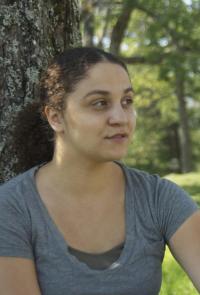 “Critical thinking is the bedrock of a functioning democracy and successful attempts to transform the world,” said social science fellow Renée Byrd (right), who is excited by Marlboro’s unique, student-driven approach to education. Renée received her bachelor’s degree in ethnic studies from Mills College, and is currently a Ph.D. candidate in feminist studies at the University of Washington. Her research focuses on contemporary prisons, neoliberal political rationalities and the politics of race, gender and sexuality. She has worked as a legal advocate for women prisoners in California and as a family advocate for youth involved in the juvenile justice system.
“Critical thinking is the bedrock of a functioning democracy and successful attempts to transform the world,” said social science fellow Renée Byrd (right), who is excited by Marlboro’s unique, student-driven approach to education. Renée received her bachelor’s degree in ethnic studies from Mills College, and is currently a Ph.D. candidate in feminist studies at the University of Washington. Her research focuses on contemporary prisons, neoliberal political rationalities and the politics of race, gender and sexuality. She has worked as a legal advocate for women prisoners in California and as a family advocate for youth involved in the juvenile justice system.
Once again, Spanish professor Rosario de Swanson confirmed for us that Spanish language, culture and literature have much to offer. In October, Rosario received the Victoria Urbano Award in drama, presented by the Asociación Internacional de Literatura y Cultura Femenina Hispánica (AILCFH) for her play titled Metamorphosis before the Obsidian Mirror: Monologue in Two Acts. She also presented a paper in September at an international conference at Howard University called “Africa and People of African Descent: Issues and Actions to Re-Envision the Future.” Her paper, “Dance as female affirmation in Ekomo, a novel from Equatorial Guinea,” was based on her recent research on Guinean literature (Potash Hill, Summer 2011, page 8).
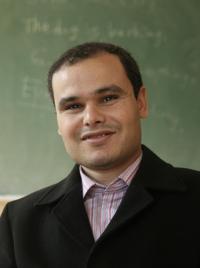 Fulbright Arabic Fellow Mohamed Jalal (right) considers the most exciting part of his fellowship the “nice and welcoming people.” This is a good thing, as it was a bit of a shock to come from the bustling port city of Mohammadia, Morocco, to a relatively quiet outpost like Marlboro. Mohamed received his bachelor’s degree in English studies from the Hassan II University of Mohammadia. Since then he has taught English in Mohammadia, most recently at the American Language Center. In addition to teaching Arabic, Mohamed has a strong interest in linguistics. After Marlboro, he hopes to continue teaching Arabic in the U.S. while he prepares for a Ph.D. program in applied linguistics.
Fulbright Arabic Fellow Mohamed Jalal (right) considers the most exciting part of his fellowship the “nice and welcoming people.” This is a good thing, as it was a bit of a shock to come from the bustling port city of Mohammadia, Morocco, to a relatively quiet outpost like Marlboro. Mohamed received his bachelor’s degree in English studies from the Hassan II University of Mohammadia. Since then he has taught English in Mohammadia, most recently at the American Language Center. In addition to teaching Arabic, Mohamed has a strong interest in linguistics. After Marlboro, he hopes to continue teaching Arabic in the U.S. while he prepares for a Ph.D. program in applied linguistics.
In an editorial published in The Commons, religion professot Amer Latif called for love, compassion and peace on the 10th anniversary of the 9/11 attacks. “As a Muslim-American, I find such inspiration in the life of the Prophet Muhammad, who, when asked how one could change the behavior of one’s children, replied, ‘Start with yourself,’” wrote Amer. He says that seeing all suffering equally is difficult work, work that begins with finding compassion within oneself. Amer also gave a series of talks at the Centre Congregation Church in Brattleboro on the intersection of Abrahamic faiths, as well as the keynote speech at the meeting of the Windham Union Association of UCC churches, “Understanding Islam through the words of Jesus.”
For those who think of terraces as nice places to grow rice or sip wine, math professor Matt Ollis has news for you. “A terrace is a structured pattern that might or might not exist in each of infinitely many mathematical objects called groups,” he said mysteriously. A recent issue of the Australasian Journal of Combinatorics includes a joint paper by Matt and former student Devin Willmott ’11 titled, “On twizzler, zigzag and graceful terraces.” “There are three somewhat separate problems addressed in the paper, tied together through their use of terraces,” said Matt. Devin collaborated with Matt on this paper as part of his Plan of Concentration on group theory.
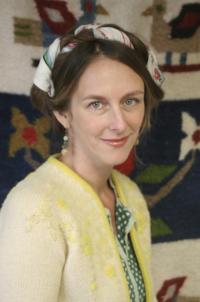 Marlboro students know Desha Peacock (right) as the director of career development, someone who can connect them with their next job prospect or internship. But Brattleboro knows her for The Desha Show, an eclectic human-interest show she produces on Brattleboro Community Television. In September, Desha received BCTV’s Best New Producer of the Year award, a great vote of confidence for her creative work. “The Desha Show is about beauty and inspiration, both inside and out,” she said. The show combines interviews with people who are living their dream with segments showcasing the work of “artists, interior designers, fashionistas and other creative types.”
Marlboro students know Desha Peacock (right) as the director of career development, someone who can connect them with their next job prospect or internship. But Brattleboro knows her for The Desha Show, an eclectic human-interest show she produces on Brattleboro Community Television. In September, Desha received BCTV’s Best New Producer of the Year award, a great vote of confidence for her creative work. “The Desha Show is about beauty and inspiration, both inside and out,” she said. The show combines interviews with people who are living their dream with segments showcasing the work of “artists, interior designers, fashionistas and other creative types.”
Continuing with her interdisciplinary research in disability studies, theater professor Brenda Foley presented a paper in September at a conference called “Chronic Illness: The Borderlands Between Health and Illness,” in Oxford, England. Her paper, “Passing Strange,” explores the ways we impose an unspoken cultural mandate that individuals with disabilities conceal their pain. “People with disabilities hide their pain, and the conditions that accompany it, behind carefully constructed presentational facades calibrated to suppress physical and emotional trauma,” said Brenda.
When visiting painting professor Craig Stockwell joined Marlboro for the fall semester, it was a bit of a family homecoming. The first settler of Marlboro in 1763 was Abel Stockwell, Craig’s great-great-great (etc.) grandfather, who died in 1777 of the “black fever” and is buried in the woods of Marlboro. “I have found it profoundly moving and intriguing to return to this hill town after so many generations,” said Craig, whose great-grandfather left the area in the 1800s to move to Massachusetts. The founder and artistic director of Artworks of Keene, as well as an adjunct professor at both Keene State College and Union Institute and University, Craig also served as a visiting artist in 2004 and as an outside examiner for several Marlboro students.
During her fall semester sabbatical, painting professor Cathy Osman spent time in the studio on a series of works that are collage based, using old sewing-pattern tissue layered with marks and patches of color. “Some of the new work can be read as landscape, reflecting the flood waters of the past month, or as an image complex with a scaffolding, referencing industrialization and chaos,” said Cathy. Some of the pieces include constructions of balsa wood that evoke broken bridges, fish netting or window blinds. “They have a sculptural presence on the wall, but also a fragility—the tissue paper is skin-like and the balsa wood weightless, giving the work a sense of impermanence—issues which are current to me now.”
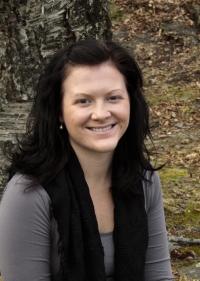 “Social and professional networking is dramatically changing how people look for jobs and prepare for interviews,” wrote student life coordinator Zoe Ogilvie (right) in the September/October issue of InChemistry. In an article titled “Upgrading Your Online Image,” co-authored with Lisa Marshall, she describes how to make the digital transition from college student to scientific professional. Zoe, who received her master’s degree in media and professional communications from Fairleigh Dickenson University, works for the career development office at Marlboro. In her article she shares sage advice and specific strategies useful to prospective employees in any field, including avoiding faux pas like sharing inappropriate photos or badmouthing previous employers.
“Social and professional networking is dramatically changing how people look for jobs and prepare for interviews,” wrote student life coordinator Zoe Ogilvie (right) in the September/October issue of InChemistry. In an article titled “Upgrading Your Online Image,” co-authored with Lisa Marshall, she describes how to make the digital transition from college student to scientific professional. Zoe, who received her master’s degree in media and professional communications from Fairleigh Dickenson University, works for the career development office at Marlboro. In her article she shares sage advice and specific strategies useful to prospective employees in any field, including avoiding faux pas like sharing inappropriate photos or badmouthing previous employers.
